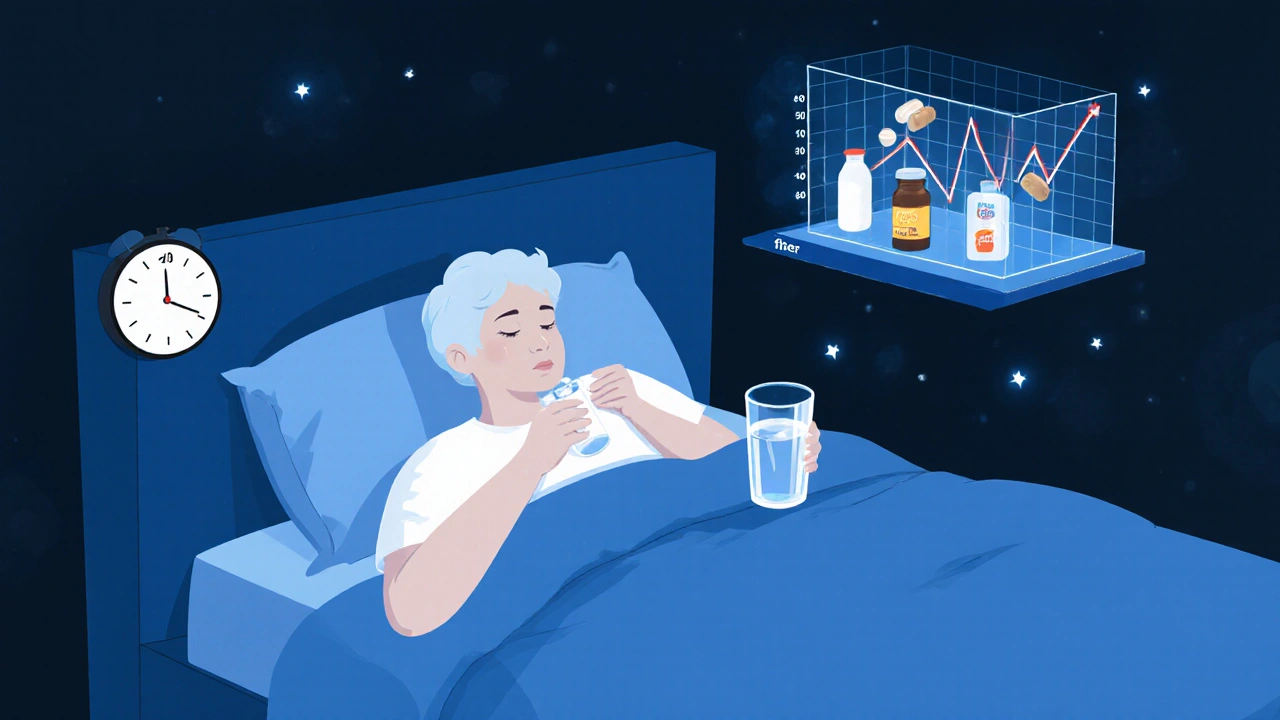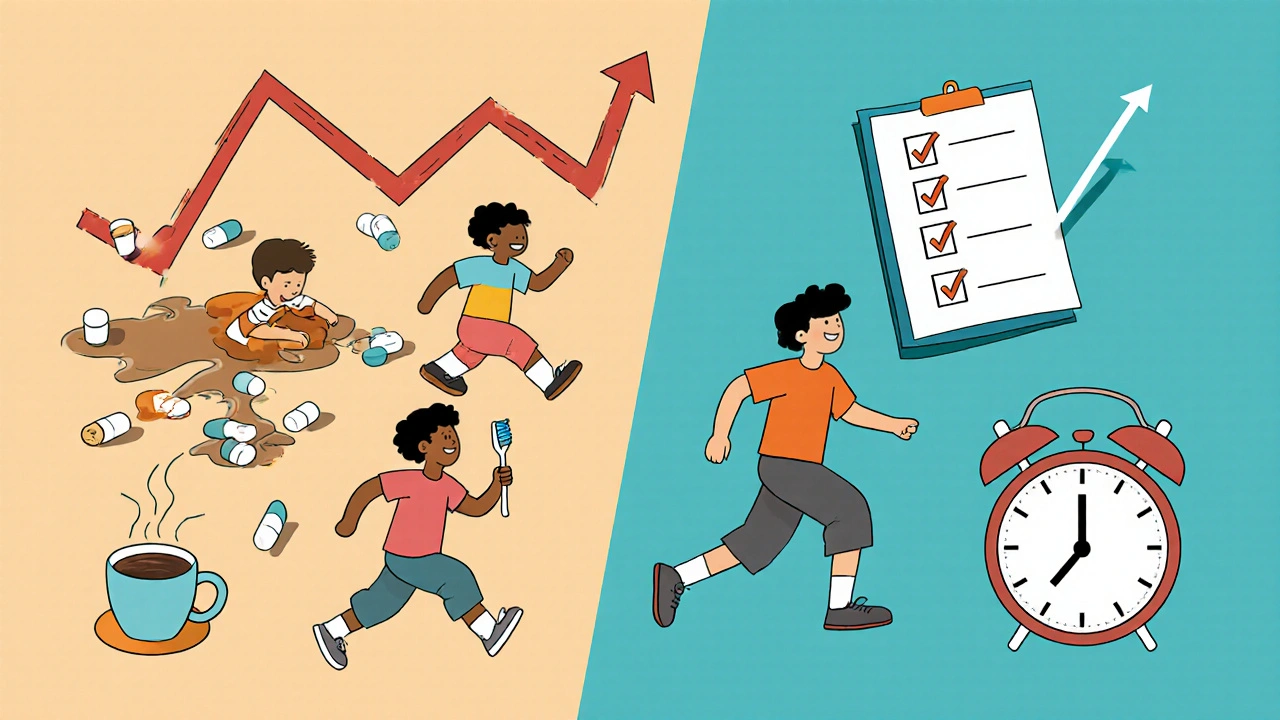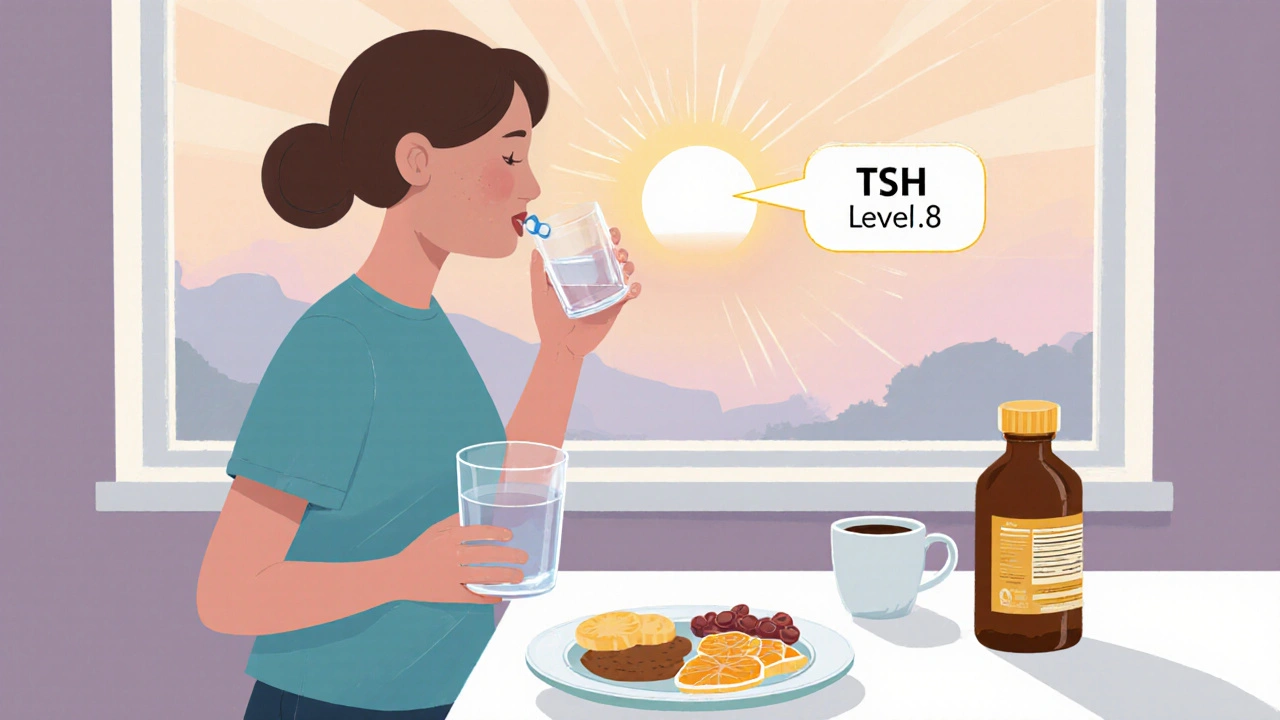Levothyroxine Absorption Calculator
How Your Routine Affects Absorption
Levothyroxine absorption can drop by up to 36% when taken with food or certain substances. This calculator estimates how your medication habits impact absorption.
Your Absorption Estimate
Normal absorption: 100%
When you’re on thyroid medication like levothyroxine, the difference between feeling fine and feeling exhausted isn’t always about the dose-it’s about when and how you take it. Many people think popping a pill with breakfast or right before bed is fine. But if your TSH levels keep bouncing around despite sticking to your dose, the problem might not be your prescription-it’s your routine.
Why Timing Matters More Than You Think
Levothyroxine is a synthetic version of the thyroid hormone T4. Your body needs it to regulate energy, temperature, metabolism, and even mood. But this medication has a narrow window for effectiveness. Too little gets absorbed, and your TSH spikes. Too much, and you risk heart palpitations or bone loss. The goal? Keep TSH between 0.4 and 4.0 mIU/L-unless you’re pregnant or have thyroid cancer, where the target is tighter. Studies show that absorption can drop by up to 36% if you take levothyroxine with food. One 2009 study tracked 65 patients and found that those who took their pill with breakfast had TSH levels 176% higher than those who took it on an empty stomach. That’s not a small fluctuation-it’s enough to make you feel sluggish, gain weight, or struggle with brain fog, even if your doctor thinks your dose is perfect.What Ruins Absorption (And How to Avoid It)
It’s not just food. A long list of common substances interfere with how your body absorbs levothyroxine:- Calcium supplements (including antacids like Tums): Reduce absorption by 27-36%
- Iron supplements: Cut absorption by 39%
- Coffee: Drops absorption by 36%-even if you wait 30 minutes after taking the pill
- Soy products (tofu, soy milk, edamame): Block absorption
- Fiber supplements (psyllium, methylcellulose): Interfere if taken too close
- Proton pump inhibitors (omeprazole, lansoprazole): Change stomach pH and reduce absorption
- Multivitamins with minerals: Often contain iron, calcium, or magnesium
Morning vs. Night: What Really Works?
For decades, the standard advice was: take levothyroxine first thing in the morning, 30-60 minutes before eating. That’s still the recommendation from the American Thyroid Association, Mayo Clinic, and UCLA Health. But here’s the twist: newer research shows bedtime dosing might work just as well-for some people. A 2020 review of 12 studies involving over 1,000 patients found that taking levothyroxine at night led to lower TSH levels and higher free T4 levels compared to morning dosing. One patient in New Zealand reported, “After years of inconsistent mornings, I switched to bedtime. My TSH dropped from 3.1 to 1.2 and stayed there.” But not all studies agree. Some show worse absorption at night. Why the confusion? Because absorption depends on your gut’s environment. At night, your stomach is empty longer, and there’s less interference from food or other meds. But if you eat dinner late or snack before bed, you’re undoing the benefit. The bottom line: Consistency matters more than timing. If you take it at 7 a.m. every day, that’s better than switching between 6 a.m. and 10 p.m. But if your mornings are chaos-kids, coffee, rushing to work-then bedtime might be your best shot.
Who Should Stick to the Morning Routine
Not everyone can switch. Certain groups need strict morning dosing:- Pregnant women: Thyroid hormone is critical for fetal brain development. The American Thyroid Association says morning dosing with a 30-60 minute fast is non-negotiable.
- Thyroid cancer patients: Those on suppressive therapy need TSH below 0.1 mIU/L. Even small absorption changes can affect outcomes.
- People with malabsorption disorders (like celiac or Crohn’s): Their bodies already struggle to absorb nutrients. Skipping the fasting window makes it worse.
What About Newer Formulations?
There’s hope on the horizon. In 2017, the FDA approved Tirosint-SOL, a liquid form of levothyroxine that doesn’t need an empty stomach. A 2019 study showed no difference in absorption whether taken with food or not. It’s a game-changer-for those who can afford it. Tirosint-SOL costs 3-5 times more than generic levothyroxine, and insurance doesn’t always cover it. Another option? A delayed-release tablet currently in phase 3 trials. Early results from the 2023 American Thyroid Association meeting showed 92% of patients maintained stable TSH levels even when taking the pill with meals. If approved, this could rewrite the rules. But right now, 89% of prescriptions are still for the old-school tablet. That means timing and fasting still matter-for most people.
Real-Life Hacks for Better Adherence
Knowing what to do isn’t the same as doing it. Here’s how real people make it stick:- Place your pill next to your toothbrush. That way, you take it before you brush-before coffee, before breakfast.
- Use a weekly pill organizer. Fill it every Sunday. Mark the thyroid pill so you don’t mix it with calcium or iron.
- Set two phone alarms: One for taking the pill, one for eating. That 30-minute buffer is easy to forget.
- Turn the bottle upside down after taking it. A simple trick from Synthroid’s guidelines-it reminds you you’ve taken it.
- Track your TSH every 6-8 weeks after changing your routine. If your levels stay stable, you’ve found your rhythm.
What If You Messed Up?
You forgot. You took it with coffee. You took it with your multivitamin. Don’t panic. Don’t double up. Just go back to your regular routine the next day. Taking an extra dose can cause symptoms of hyperthyroidism-racing heart, anxiety, tremors. It’s not worth the risk. One slip-up won’t wreck your progress. But if it happens often, it will. That’s why consistency beats perfection.When to Talk to Your Doctor
If you’ve tried the standard morning routine and still feel off-fatigued, cold, depressed, gaining weight-it’s time to revisit your plan. Ask:- “Could my timing be the issue?”
- “Could I switch to evening dosing?”
- “Should I consider Tirosint-SOL?”
- “Are any of my other meds interfering?”
Can I take levothyroxine with water?
Yes, water is the only safe liquid to take with levothyroxine. Avoid coffee, tea, milk, or juice-they interfere with absorption. Use plain, room-temperature water, and wait 30-60 minutes before drinking anything else.
What if I take levothyroxine and then eat breakfast right away?
If you accidentally eat right after, don’t take another dose. Wait until the next day and return to the correct routine. One meal won’t cause harm, but doing it regularly can lead to unstable TSH levels and worsening symptoms. Try to make it a habit: pill, then wait, then eat.
Can I take levothyroxine at bedtime instead of in the morning?
Yes, for many people, bedtime dosing works just as well-or better. Take it at least 3-4 hours after your last meal and avoid snacks or drinks (except water) afterward. Studies show some patients get more stable TSH levels at night. But if you’re pregnant or have thyroid cancer, stick to the morning protocol.
Does coffee really affect levothyroxine absorption?
Yes. Even if you wait 30 minutes after taking your pill, coffee can reduce absorption by 36%. The compounds in coffee interfere with how the drug moves through your gut. If you love your morning coffee, either take your thyroid pill at night or wait 60+ minutes after taking it before drinking coffee.
How long should I wait after taking levothyroxine before taking other medications?
Wait at least 3-4 hours before taking calcium, iron, magnesium, antacids, or multivitamins. For cholesterol meds like cholestyramine or seizure drugs like phenytoin, the same rule applies. If you take multiple meds, work with your pharmacist to build a schedule that avoids interactions.
Is there a generic version of levothyroxine that’s just as good?
Yes. Generic levothyroxine is FDA-approved and effective for most people. But switching between brands-even generics-can cause small changes in absorption. Once you find a brand that works, stick with it. If you must switch, ask your doctor to recheck your TSH in 6-8 weeks.
If you’re feeling off despite taking your thyroid medication, don’t blame yourself. The problem isn’t laziness-it’s a complex interaction between your gut, your meds, and your daily habits. The fix isn’t always a new dose. Sometimes, it’s just a new time.


Alyssa Torres
November 19, 2025 AT 06:11OMG I JUST REALIZED I’VE BEEN TAKING MY LEVOTHYROXINE WITH MY MORNING SMOOTHIE FOR A YEAR 😭
My TSH was always all over the place and my doctor kept upping my dose… turns out I was just poisoning the absorption.
Switched to water + 45 min before breakfast and my energy is back. I’m not crying anymore, I’m dancing.
Thank you for this post. I feel seen.
Also, I now keep my pill next to my toothbrush. It’s a ritual. My soul thanks you.
Summer Joy
November 21, 2025 AT 02:29soooo… you’re telling me my $80/month thyroid med is basically useless if i don’t time it like a NASA launch??
and coffee is the enemy??
what if i’m just a chaotic person who eats toast while scrolling tiktok??
am i doomed??
also why is everyone so serious about this?? it’s a pill, not a sacred ceremony 🙄
Aruna Urban Planner
November 21, 2025 AT 15:01The pharmacokinetics of levothyroxine are highly sensitive to gastric pH and intestinal transit time, both of which are modulated by dietary macronutrients and concomitant medications.
While morning administration remains the gold standard in clinical guidelines, circadian variability in gastric motility and hepatic metabolism may favor nocturnal dosing in a subset of patients with stable gastrointestinal function.
However, adherence to a consistent temporal regimen is a more robust predictor of euthyroidism than the absolute timing of administration.
Further research is needed to stratify patient subpopulations based on gut microbiome composition and drug transporter polymorphisms.
Nicole Ziegler
November 22, 2025 AT 09:18me taking my pill at 11pm after dinner and then immediately falling asleep 😴
no coffee, no snacks, no drama
my TSH is now 1.8 and i can actually feel my toes again
also i use a pill organizer with a little thyroid icon 🏷️❤️
you’re welcome future thyroid warriors
Bharat Alasandi
November 23, 2025 AT 08:25bro, i used to take mine with my chai and wonder why i was always tired
switched to night time, 4 hours after dinner, no snacks, just water
my brain fog lifted like a foghorn
also, if you’re Indian and eat soy curry every night… yeah, that’s probably why you’re still hypothyroid
change the routine, not the dose
simple.
also, yes, generic works fine - just don’t switch brands every month 😅
Katie Magnus
November 24, 2025 AT 20:40so you’re saying the entire medical establishment got this wrong for decades?
and now we’re supposed to believe some guy on the internet who says ‘take it at night’?
what’s next? ‘maybe water isn’t actually good for you’?
this is just fearmongering dressed up as science.
my grandma took hers with milk and lived to 92.
trust your doctor, not blog posts.
King Over
November 26, 2025 AT 03:20took it with coffee once
felt weird
now i dont
water only
morning
no drama
life good
bye
Johannah Lavin
November 27, 2025 AT 18:04to the person who said coffee ruins absorption - YES. I thought I was being ‘resilient’ by drinking coffee 20 min after my pill. Turns out I was just sabotaging my thyroid. I cried. Then I bought a cute little water bottle just for my pill routine 🫖
Also, bedtime dosing changed my life. No more rushing before work. No more coffee guilt.
To anyone struggling - you’re not broken. You just need a better system. And you’re not alone.
❤️
Ravinder Singh
November 27, 2025 AT 23:22Let me tell you something - this isn’t just about pills and timing. It’s about reclaiming agency over your body.
For years, I blamed myself for being lazy, for not losing weight, for feeling like a zombie. But it wasn’t me. It was the chaos of my routine.
I used to take my levothyroxine while brushing my teeth, then gulp down coffee like it was oxygen.
Now? I wake up. I drink water. I take the pill. I sit. I breathe. I wait.
And for the first time in 8 years, I feel… human.
It’s not magic. It’s discipline. It’s respect.
And yes, the generic works - but only if you treat it like the lifeline it is.
Don’t let convenience steal your vitality.
You deserve to feel alive.